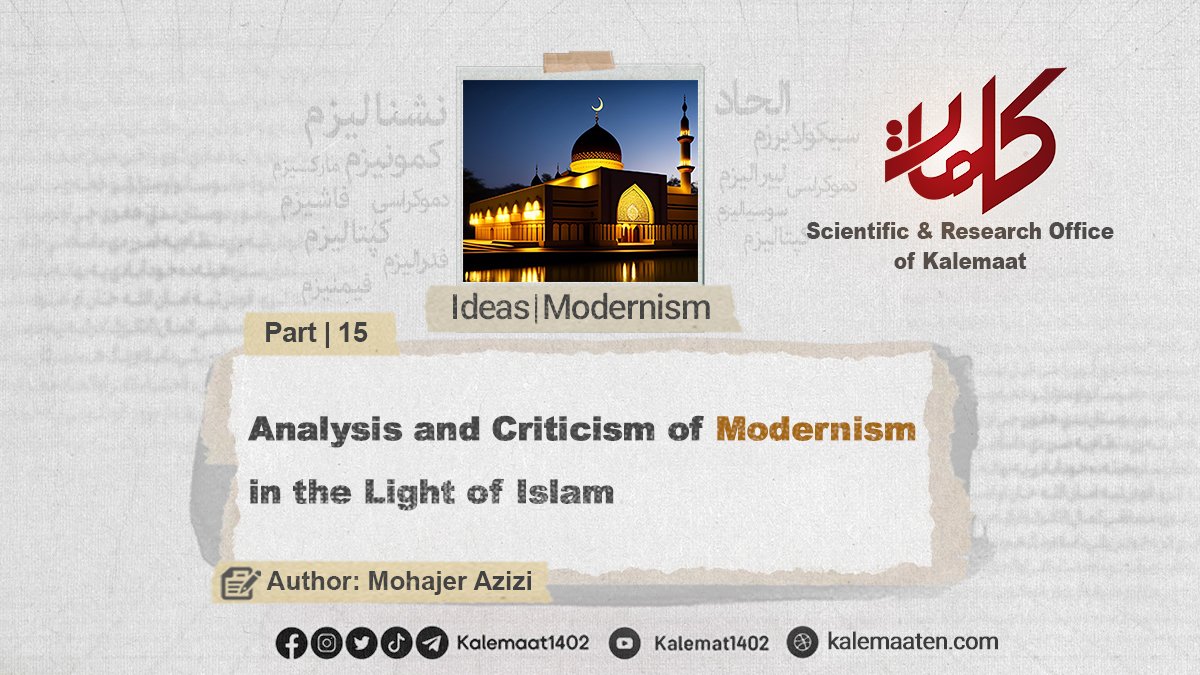Author: Mohajer Azizi
Analysis and Criticism of Modernism in the Light of Islam (Part 15)
Modernism, especially in Arabic poetry, progressed through four stages, and these stages are:
-
The first stage, 1932:
In this year, the «جماعة أبولو» “Abullo community” was established at the invitation of Dr. “Ahmed Zaki Abu Shadi.” In examining this community, we saw how they established an artistic school based on secularization and distancing from religion. Their goal was to show various aspects of life without the constraints of religion.
Accepting the Abullo school caused tendencies such as symbolism, mysticism, and eroticism to enter their poetry.
-
The second stage:
This stage is the same stage of immorality that was manifested in the poetry of “Nizar Qabbani.” During this period, a kind of rebellion against history is seen and, it is a call towards naked and explicit literature.
-
The third stage in 1947:
This stage began with the writing of the first poem by “Nizar Qabbani” called «قالت لی السمراء» “The blonde told me”. The representatives of this period are poets such as Nizar Qabbani, Salah Abdul Sabour and Siyyab.
-
The fourth stage:
This stage began with “Adonis” and is considered the most dangerous stage, because he called for a complete break from the heritage, the past and any connection with history. He called for a revolution in everything and pretended that innovation and initiative are only possible if the links with the past are completely cut off; while this is the same Marxist and Zionist call that he dressed up as “modernism” and “innovation”. [1]
In this way, the roots of modernism were sown in the Arab countries; this idea became a very big danger and gradually became so dangerous that it is neither manageable nor controllable. All Arab countries and the Islamic world are now affected by the consequences of this idea, and it has entered all aspects of their lives.
3. Prominent figures of the modernist school in the West
There are many figures who have spread and promoted modernism; here we will only mention the founder and prominent and influential figures of this idea:
-
Charles Baudelaire (1821-1867): He is known as the founder of modernism in the Western world. He was a famous writer and poet in France. Baudelaire was an adventurous person and always invited people to sexual, intellectual and moral debauchery, and he was very revelry and fun-loving. He has a collection of poems called Flowers of Evil, which was translated into Arabic by the Arab poet Ibrahim Naji.
Ghali Shukri writes In his book “Where is our modern poetry going?”: “Baudelaire became the messenger of modern poetry when his painful feelings took shape in a clear way; a kind of individual life that did not correspond to the accepted values and models of his time.” [2]
And in order to better understand who this “prophet of modern poetry” who is so revered was, I will quote part of Mustafa Al-Sahrati’s introduction to the translation of the divan “Flowers of Evil”:
“His life was an example of loss and deviation from his childhood. After finishing high school, he spent some time in the Latin Quarter of Paris, where he lived in a corrupt and unruly environment. There he contracted syphilis and spent his youth in illicit and unbridled relationships with Parisian prostitutes. Finally, the final stage of his life was accompanied by addiction to drugs and alcohol.” [3]
Ibrahim Naji, the translator of The Flowers of Evil, also writes about Baudelaire: “Baudelaire believed that hurting others was pleasant and enjoyed it. He himself lived with a kind of mental disorder and suffered from it.” [4]
-
Gustave Flaubert (1821-1880): He was one of the famous and well-known writers in France. He had excellent skills in novel writing and is considered one of the greatest novelists in Western literature. Flaubert wrote realistically and used very rich literature and deep psychological analyses in his works and writing. Writers such as “Guy de Maupassant, Emile Zola, and Alphonse” were inspired by him. Flaubert himself was influenced by the style and themes of Balzac, the 19th-century writer.
-
Mallarme (1842-1898): A French poet and one of the most important figures of the Symbolist school. He was born in Paris in 1842 and died in Wellen on September 9, 1898. Mallarme was a student of Charles Baudelaire (the founder of modernism). He played a special role in the dissemination and promotion of the modernist school with his teacher.
-
Vladimir Mayakovski (born July 19, 1893 – died April 14, 1930) was a Russian revolutionary futurist poet and playwright. His theater was known as the Theater of the Revolution. He is remembered as one of the geniuses of art in the Soviet Union. He always called for breaking away from the past and rushing towards the future.
Continues…
Previous Part / Next Part
References:
- Ibid., pp. 32, 33.
- Where is our modern poetry going?, p. 16.
- Awaz Al-Qarni, Modernity in the Islamic World, p. 23.
- Ibid., p. 23.



